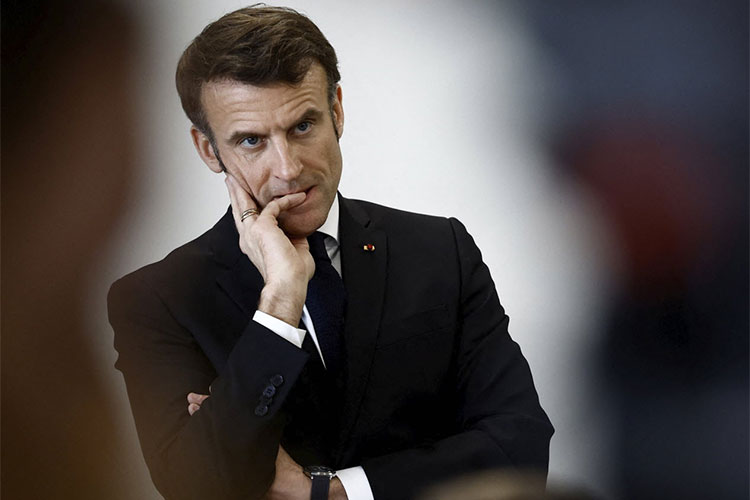Memory Commission: France’s dilemma in Disclosing the Names of its Representatives

French President Emmanuel Macron continued his path to calming the “war of memory” in instalments with Algeria, by acknowledging that the freedom fighter, Djamila Boupacha, had been tortured by French soldiers. At the same time, he spoke of the imminent installation of the Algerian-French mixed committee, concerned with studying French colonial files in Algeria, between 1830 and 1962, which was announced in August 2022.
Macron’s confession came, on Wednesday, in Paris on the occasion of honouring the activist and lawyer Gisèle Halimi, who pleaded in favour of the fighter Djamila Boupacha during the liberation revolution, when she was sentenced to death in 1960 for her activity on the side of the Mujahideen (placing a bomb in a bar frequented by the French), and he also admitted the responsibility of the French soldiers in torturing her.
The honoured French lawyer succeeded in promoting the case of Djamila Boupacha by highlighting the methods of torture used by the French army during the Algerian revolution, in a way that shook public opinion in France, which helped Halimi, who was afraid of the liquidation of the war veteran Boupacha in prison in Algiers, so she demanded to transfer her to “Health Prison” in France to secure her life then she was released before independence.
Macron’s admission of the torture of Boupacha by the French occupation army is the third step in this regard, after the first initiative that concerned the professor of mathematics at the University of Algiers, the fighter for the Algerian cause, Maurice Audin, who was liquidated by the paratroopers of the occupation army, as well as the second initiative that was represented in the recognition of the first man in France of the responsibility of the French army for the assassination of the lawyer of the revolution, Ali Boumendjel, after the occupation army at that time spread the news of his suicide in prison, just as the same narrative about Maurice Audin had spread before that.
In the same activity, the French President announced the imminent installation of the Algerian-French mixed committee consisting of historians, which will be responsible for working on the history of colonialism in Algeria from 1830 to 1962, and it is the committee that he announced during his visit to Algeria in August 2022, and this committee was entrusted to each of the Director of the National Archives, Abdelmadjid Shikhi, and the French historian Benjamin Stora, a task that failed, as is well known, due to the Algerian side’s lack of enthusiasm for the initiative, which was limited to the years of the liberation revolution only (1954/1962).
The French president defended his project related to memory when he said that “Gisèle Halimi carried the cause of Algeria’s independence. The Algerian war must now take its full place in our memories in France and Algeria,” and he was referring to the imminent “installation of the Algerian-French mixed committee composed of historians”, which will be responsible for working on the history of colonialism from 1830 to 1962.
An agreement was not reached between the two parties to establish a mixed committee to discuss the memory file, except after the Algerian party imposed its vision regarding the treatment of this file. As the French tried to limit the period to the eight years of the liberation revolution only, and the goal was clear behind that, which is to search for censures to justify Paris’ escape from offering an apology to Algeria, such as accusing the Liberation Front Army of violating the rights of the “Harkis” and the Pieds-Noirs following the cease-fire in March 19, 1962, while President Abdelmadjid Tebboune insisted that the period in question should include all the 132 years of occupation, which witnessed the liquidation of nearly seven million Algerians, according to figures cited by Algerian historians.
Despite the announcement of the establishment of this committee in the past summer, it has not yet been installed, and at the time when the Algerian side announced the formation of its committee, which includes historians Mohamed Lahcene Zeghidi, Mohamed El-Korso, Abdelaziz Filali, Djamel Yahiaoui and Idir Hachi in an official statement, only the French side did not officially announce the names of the representatives of its committee, but Le Monde newspaper, which has become almost an official mouthpiece for the Elysee Palace in recent months, leaked the names of the committee from the French side, and they are Benjamin Stora as president and Tramor Quemeneur, as Secretary General, Jacques Frémeaux, Florence Hudowicz and Jean-Jacques Jordi.
According to Echorouk’s sources, the Algerian side has reservations about Benjamin Stora’s return to work in the mixed committee, given the nature of the report he submitted to the French presidency in January 2021, because it did not include what the Algerians were aspiring to, in addition to the presence of other names known for their hostility to everything that is Algerian. After all, the majority of the members of this committee are Pieds-Noirs or their relatives, which would undermine the work of the mixed committee, which is the likely reason behind the delay in its official inauguration, noting that its final report will be submitted within a year, as stated in its announcement.





